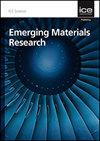Creep behaviour of shock wave surface treated aluminium – MWCNT nanocomposites
IF 1.2
4区 材料科学
Q4 MATERIALS SCIENCE, MULTIDISCIPLINARY
引用次数: 0
Abstract
This work focuses on the creep characteristics of shock wave surface treated aluminium nanocomposites for aerospace and defence applications. Aluminium nanocomposites were undergone a surface treatment in shock tube with free piston (STFP) setup condition. The indentation creep study of shock wave surface treated Al – 4.9 Mg alloy (AA5083) reinforced with multi walled carbon nanotubes (MWCNT) nanoparticle with varying weight fraction of MWCNT nanoparticles was tested under two stresses such as 113 MPa and 170 MPa at different temperatures ranges from 473 K to 573 K. The base and nanocomposite materials were developed using a semi-solid state casting method. The instantaneous shock material reaction is characterised by carbide formation of the developed 1.5 wt% and 1.75 wt% nanocomposites. From the obtained results of creep study, shown that the nanocomposites with 1.5 wt% and 1.75 wt% of MWCNT have better creep resistance and stress exponent value at high working temperature compared to base alloy material. The enhanced creep resistance is due to the increased addition of MWCNT nanoparticle into the Al – 4.9 Mg matrix material and nanostructured carbide formation. The attained stress exponent values propose the major creep mechanism in the base alloy and nanocomposite materials was grain boundary sliding.激波表面处理铝- MWCNT纳米复合材料的蠕变行为
这项工作的重点是用于航空航天和国防应用的冲击波表面处理的铝纳米复合材料的蠕变特性。在自由活塞(STFP)设置条件下,在冲击管中对铝纳米复合材料进行了表面处理。冲击波表面处理Al–4.9的压痕蠕变研究 用具有不同重量分数的多壁碳纳米管(MWCNT)纳米颗粒增强的镁合金(AA5083)在两种应力下进行了测试,如113 MPa和170 不同温度下的MPa范围为473 K至573 K.使用半固态铸造方法开发了基体和纳米复合材料。瞬时冲击材料反应的特点是生成1.5 wt%和1.75 wt%纳米复合材料。从获得的蠕变研究结果来看,纳米复合材料与1.5 wt%和1.75 与基础合金材料相比,wt%的MWCNT在高工作温度下具有更好的抗蠕变性和应力指数值。抗蠕变性能的提高是由于在Al–4.9中增加了MWCNT纳米颗粒 Mg基体材料和纳米结构碳化物的形成。所获得的应力指数值表明,基底合金和纳米复合材料的主要蠕变机制是晶界滑动。
本文章由计算机程序翻译,如有差异,请以英文原文为准。
求助全文
约1分钟内获得全文
求助全文
来源期刊

Emerging Materials Research
MATERIALS SCIENCE, MULTIDISCIPLINARY-
CiteScore
4.50
自引率
9.10%
发文量
62
期刊介绍:
Materials Research is constantly evolving and correlations between process, structure, properties and performance which are application specific require expert understanding at the macro-, micro- and nano-scale. The ability to intelligently manipulate material properties and tailor them for desired applications is of constant interest and challenge within universities, national labs and industry.
 求助内容:
求助内容: 应助结果提醒方式:
应助结果提醒方式:


